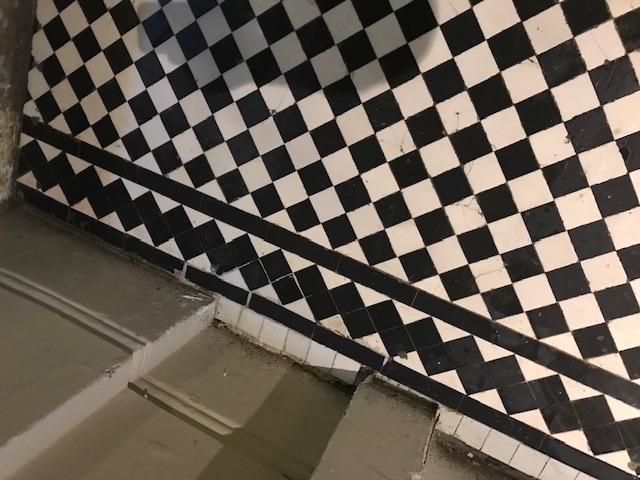This Victorian floor was found during the refurbishment of a hotel in Brixton, South London. The manager wanted a practical surface that could cope with day-to-day traffic and given this was a period feature of the property why not bring it back into use. Working in a narrow corridor in a busy hotel would normally be very difficult but as the property was being renovated there were only a few people around so it wouldn’t be an issue.
 |
 |
The tiles were stained black with dirt and grease and badly damaged around the perimeter which was probably the reason it was covered up in the first place. Not a problem though, in fact these old Victorian tiled floors are very resilient and I have renovated floors in worse condition than this.
Cleaning and Repairing a Victorian Tiled Hallway Floor
To tackle the dirt and grease the floor was sprayed with a combination of Tile Doctor Pro-Clean mixed with Tile Doctor Remove and Go which was left to soak in for ten minutes and then scrubbed in with a black pad fitted to a rotary machine. This process was repeated several times rinsing off the soiling with water and extracting with a wet vacuum after each clean.
Once most of the dirt and grease had been removed repairs were carried out starting with the removal of the broken tiles and rubble. The subfloor was then built up with a self-levelling compound and then once set re-tiled with matching replacements. Luckily, there are a few places that we can source either original reclamation Victorian tiles or reproduction tiles that are usually a very good match.
 |
 |
The next stage was to further clean up the tiles by giving the whole floor an acid rinse using Tile Doctor Grout Clean-up which has several benefits which include the removal of mineral deposits such as grout smears and alkaline salts. Salts in particular can be a problem with old floors like this as they were laid before the invention of damp proof membranes. Additionally using an acidic product at this stage neutralises the pH level of the floor after the use of strong alkaline cleaners earlier in the restoration. The floor was then left to dry out overnight.
 |
 |
Sealing a Victorian Tiled Hallway Floor
We returned the following day to seal the tiles. First checking the moisture level of the tiles with a damp meter to confirm the floor was dry, which it was. Tile Doctor Colour Grow was chosen as the sealer, it’s an impregnator that soaks into the pores of the tile protecting it from within. It is also a breathable sealer so will cope with any moisture rising through the floor

As you can see from the pictures the hallway was transformed, the previously dark dingy space was now bright and clean, and the tiles looked stunning. Our client was very happy with the result and once all the renovations are completed, he will be ready to re-open the hotel.



Old tiled floors won’t have a damp proof membrane installed under the Floor so it’s essential to use a fully breathable sealer that will allow moisture to rise through the tile and evaporate at the surface. Without this moisture will reach out to the Floors where it can result in rising damp.